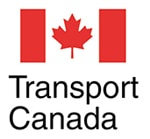
Although the cause of the accident in Lac-Mégantic remains unknown at this time, Transport Canada is moving forward to build upon the safety advisories received last Friday from the Transportation Safety Board and further enhance existing safe railway operations and the security of railway transportation.
Effective immediately, the emergency directive requires all rail operators to:
- Ensure that no locomotive attached to one or more loaded tank cars transporting dangerous goods is operated with fewer than two qualified persons on a main track or sidings;
- Ensure that no locomotive attached to one or more loaded tank cars transporting dangerous goods is left unattended on a main track;
- Ensure, within five days of the issuance of the directive, that all unattended controlling locomotives on a main track and sidings are protected from unauthorized entry into the cab;
- Ensure the directional controls, commonly known as reversers, are removed from any unattended locomotives, preventing them from moving forward or backward, on a main track or sidings;
- Ensure that their company’s special instructions on hand brakes are applied to any locomotive attached to one or more cars that is left unattended for more than one hour on a main track or sidings;
- Ensure that, in addition to complying with their company’s special instructions on hand brakes referred to in the item immediately above, the automatic brake is set in full service position and the independent brake is fully applied for any locomotive attached to one or more cars that are left unattended for one hour or less on a main track or sidings.
The safety of Canadians is Transport Canada’s top priority. The department is committed to working with the rail industry to examining any other means of improving rail safety.
Transport Canada has been in contact with the railway industry, and in particular with CN, CP and the Railway Association of Canada (RAC), to work together to promote the continued safety of Canada’s rail system.
The majority of railways maintain a culture of safety and security, as shown by the notable decline in derailments and train accidents over the past few years.
Transport Canada inspectors will continue to work in cooperation with the Transportation Safety Board as it conducts its investigation.
Transport Canada inspectors are at Lac-Mégantic determining whether there has been non-compliance with regulatory requirements.
Railway safety regulations exist to ensure the safety and protection of the public. If these regulations were not followed, the department will not hesitate to take action.
Transport Canada is responsible for transportation policies and programs. It promotes safe, secure, efficient and environmentally-responsible transportation. Transport Canada reports to Parliament and Canadians through the minister of Transport. It works with its portfolio partners, other government departments and jurisdictions, and industry to ensure that all parts of Canada’s transportation system work well.
The complete release, along with Related Items, can be found here.